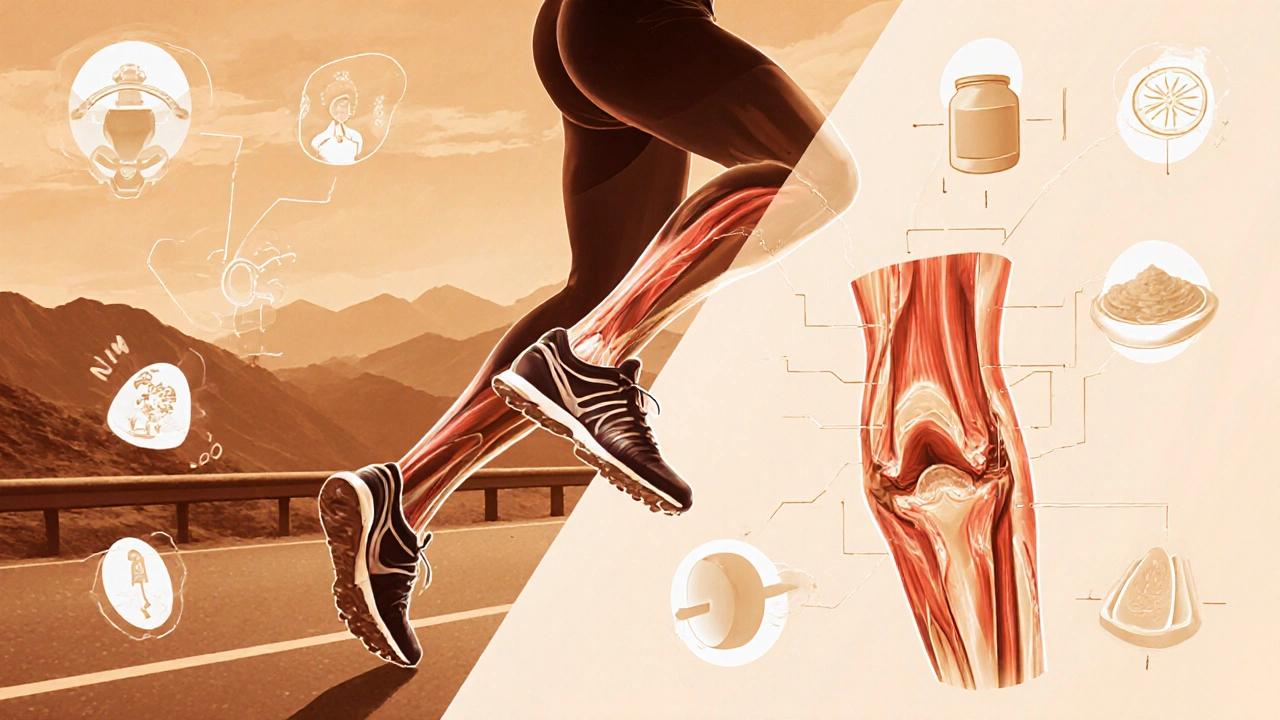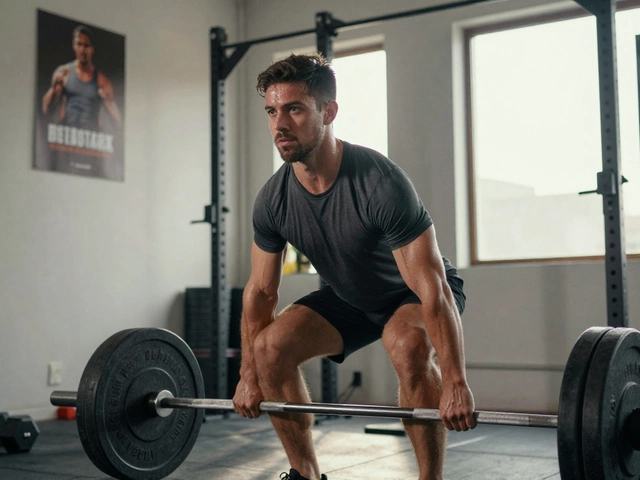
Running November 20, 2025
Can You Be Muscular and Run a Marathon? The Real Truth About Muscle and Endurance
Marathon Muscle & Endurance Calculator
Protein Needs
Daily Protein Requirement:
X grams
For muscle maintenance during marathon training
Caloric Needs
Daily Caloric Requirement:
X calories
For maintaining muscle while running a marathon
Strength Training Recommendations
Body Fat Percentage Targets
Ideal Range:
X% - Y%
For optimal performance and muscle endurance
People always ask: can you be muscular and run a marathon? It feels like these two goals are on opposite ends of the fitness spectrum. One side wants big, dense muscles. The other wants to run 26.2 miles without stopping. But here’s the truth-yes, you absolutely can be both. Not just survive a marathon, but finish strong, with visible muscle, and feel powerful doing it. It’s not easy. It’s not common. But it’s completely possible.
Why People Think Muscle and Marathon Don’t Mix
The myth starts with what you see in magazines. Bodybuilders look like they’ve been carved out of stone. Runners look like they’ve been stretched thin by wind. One group lifts heavy. The other runs long. They train differently. Eat differently. Rest differently. So it’s natural to assume they can’t coexist.But that’s where the misunderstanding begins. You don’t need to be a bodybuilder to be muscular. And you don’t need to be a marathoner to be lean. You need balance. Most people fail because they try to do both at 100%-lift like a powerlifter while running 60 miles a week. That’s not training. That’s burnout waiting to happen.
What Muscular Actually Means for Runners
When we say "muscular," we’re not talking about 20-inch biceps or a 400-pound squat. We’re talking about functional muscle. The kind that stabilizes your hips, drives your stride, protects your knees, and keeps you upright when you’re hitting mile 20 and your legs are screaming.Runners who carry muscle have:
- Strong glutes that prevent IT band pain
- Core muscles that stop them from hunching over after mile 15
- Calves and quads that absorb impact instead of breaking down
- Upper body strength that helps with arm drive and breathing rhythm
These aren’t show muscles. They’re survival muscles. And they come from smart strength training-not bodybuilding routines.
How to Train for Both Without Burning Out
You can’t do bodybuilding and marathon training side by side and expect to thrive. But you can do strength training for runners alongside your mileage. Here’s how:- Keep strength sessions short-30 to 40 minutes, max. Two to three times a week is enough.
- Focus on compound movements: squats, deadlifts, lunges, push-ups, pull-ups. These build real-world strength without wasting energy on isolation curls.
- Use moderate weights. Aim for 3 sets of 8-12 reps. Not max lifts. Not failure sets. Just enough to stimulate muscle without crushing your legs.
- Never lift heavy the day before a long run. Schedule strength on easy run days or rest days.
- Stop adding muscle mass once you’re strong enough. Once your form improves and your joints feel stable, shift to maintenance mode.
One runner I know, a 38-year-old teacher from Bath, added 12 pounds of muscle over six months while training for his first marathon. He didn’t get huge. But he dropped 14 minutes off his time. Why? Because his body stopped falling apart during long runs. His hips didn’t collapse. His lower back didn’t lock up. He had the strength to hold form when others slowed to a shuffle.

What to Eat: Fueling Muscle and Mileage
You can’t build muscle on a 1,800-calorie diet and run 100 miles a month. And you can’t run a marathon on a bodybuilder’s 4,000-calorie clean bulk.Your nutrition needs to be a hybrid:
- Protein: 1.6 to 2.0 grams per kilogram of body weight. That’s about 120-150g for a 160-pound person. Spread it across meals. Don’t dump it all in one shake.
- Carbs: Your main fuel. Eat them before and after long runs. Oats, sweet potatoes, rice, bananas. Don’t fear carbs-they’re what keep your muscles from breaking down during endurance sessions.
- Fats: Don’t cut them. Healthy fats from nuts, avocado, olive oil help with joint health and hormone balance.
- Timing matters. Eat a protein-carb combo within 30 minutes after a hard run or strength session. A chicken sandwich with whole grain bread. Greek yogurt with berries and honey.
One study from the University of Birmingham tracked runners who lifted weights and found they lost less muscle during marathon training than those who only ran. Their protein intake was the key difference.
The Downside: What Can Go Wrong
This isn’t a magic combo. If you mess it up, you’ll pay for it.Here’s what happens when people get it wrong:
- Overtraining: Lifting heavy after a 20-miler? You’re asking for a stress fracture or tendonitis.
- Under-eating: Trying to stay lean while running 80 miles a week? You’ll lose muscle, not fat. Your metabolism slows. Your energy crashes.
- Ignoring recovery: Sleep is non-negotiable. If you’re not sleeping 7-8 hours, your muscles won’t repair. Your runs will suffer.
- Too much volume: Doing 5 strength sessions a week while logging 70 miles? You’re not training. You’re punishing yourself.
There’s a reason elite runners don’t look like Arnold. They don’t need to. They’ve optimized for efficiency, not size. But they still lift. They still build strength. Just not in the way most people think.

Real People, Real Results
You don’t have to take my word for it. Look at the facts.Jonas Deichmann, a German endurance athlete, ran across the Americas-over 10,000 kilometers-in 138 days. He carried 90kg of gear. He also had visible muscle. He didn’t run to lose weight. He ran because he wanted to test human limits. And he trained with weights every day.
Or take Sarah Bard, a former powerlifter who switched to ultrarunning. She didn’t lose her muscle. She just changed how she used it. She now holds multiple records in 100-mile races. Her legs are powerful, not skinny. Her core is rock solid. She doesn’t look like a typical runner. And she wins races because of it.
Final Answer: Yes, But With Conditions
Can you be muscular and run a marathon? Yes. But you can’t be a bodybuilder and run a marathon. You can’t be both at the same extreme. You have to choose balance.Build functional strength. Eat enough protein and carbs. Recover like your life depends on it. And don’t fall for the myth that runners have to be skinny to be fast. Speed comes from efficiency. Power comes from strength. And endurance comes from smart training-not starvation.
If you want to finish a marathon feeling strong, not broken, then yes-get strong. But train smart. Train with purpose. And remember: the best runners aren’t the lightest. They’re the most resilient.
Can you gain muscle while training for a marathon?
Yes, but only if you’re new to lifting or coming back from a long break. Your body can adapt to both stimuli at once during the early stages. Once you’re past beginner gains, muscle growth slows down. At that point, focus on maintaining muscle with moderate strength work, not building bulk. Prioritize recovery and nutrition, and you’ll hold onto what you have.
Will lifting weights slow me down in a marathon?
Not if you do it right. Lifting heavy or doing too many reps can make you feel sluggish. But strength training improves running economy-the amount of oxygen you use at a given pace. Stronger muscles mean less wasted movement. You’ll use less energy to run the same speed. Many runners see their times drop after adding 6-8 weeks of smart strength work.
Should I stop lifting during marathon training?
No. Stopping strength training is one of the biggest mistakes runners make. Without it, your muscles weaken, your form breaks down, and injury risk goes up. Instead, reduce volume. Drop from 3-4 sessions to 1-2 per week. Focus on maintenance: bodyweight moves, light dumbbells, core stability. Keep your body strong enough to handle the miles.
How much muscle is too much for a marathon runner?
There’s no exact number, but if you’re carrying extra weight that doesn’t help your stride-like bulky arms or thick thighs without power-you’re carrying dead weight. Marathon runners benefit from lean, dense muscle. If your body fat is above 12% (men) or 18% (women) and you’re still gaining size, it’s time to shift focus from building to refining. Look at your performance, not the scale.
Do I need to eat more if I’m lifting and running?
Yes. You’re burning more calories than most people realize. A 70kg runner training for a marathon burns 3,000-3,800 calories a day during peak weeks. Add strength training, and you’re pushing 4,000. If you’re not eating enough, your body will break down muscle for fuel. Eat enough protein, carbs, and healthy fats. Don’t try to be leaner than your body can sustain.
What to Do Next
If you’re serious about being strong and finishing a marathon:- Start with a 4-week strength plan focused on squats, deadlifts, push-ups, and planks.
- Track your weekly mileage and strength sessions together-don’t let one dominate the other.
- Measure progress by how you feel on long runs, not by how big your arms look.
- Get your body fat percentage checked. Aim for 10-14% for men, 16-20% for women. That’s where strength and endurance meet.
- Rest. Seriously. Two full rest days a week. Sleep 7+ hours. Your muscles grow when you’re not training.
The marathon isn’t about being the lightest. It’s about being the strongest version of yourself-body and mind. And that version? It’s got muscle. It’s got grit. And it’s ready to run.




